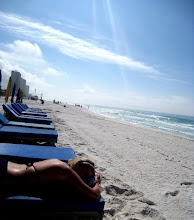While traveling in Spain I visited Cordoba in Andalusia. Our tour guide took us on a walking tour of the city. We passed the Jewish Medina. This is an area that was confined behind fortified walls. Centuries ago, a city sprung up within these walls within the bustling city of Cordoba. Our guide was very open about the fact that the traditionally Catholic Spaniards were once discriminating against Jewish citizens.
Now as we passed through the medina, she focused on a modern discrimination: the gypsies. She went on and on about the gypsies. She warned us to stay away from them. She explained different ways they would attempt to con us. She told us to never give them money. We all nodded our heads consenting, most of us unknowingly, to a modern form of discrimination. I think it is easy to look back on history, to the slaves in the south, to the Jews in WWII, to anything, and think, “I wouldn’t ever treat someone that way.”
 What we lose sight of is the fact that when we are in the moment, we do not realize that we are discriminating. It is the way of our society. Our culture is learned through socialization. Therefore, what is known to be right or wrong in learned through what those who know more, our parents, our elders, our teachers… our tour guides. In Spanish culture, there is a social hierarchy. They do not believe that acknowledging gypsies is good. They believe that those that chose to live their lives differently have more power. It is a hardly recognized hierarchy of many cultures. In the US a tour guide would say the same thing about the homeless or beggars.
What we lose sight of is the fact that when we are in the moment, we do not realize that we are discriminating. It is the way of our society. Our culture is learned through socialization. Therefore, what is known to be right or wrong in learned through what those who know more, our parents, our elders, our teachers… our tour guides. In Spanish culture, there is a social hierarchy. They do not believe that acknowledging gypsies is good. They believe that those that chose to live their lives differently have more power. It is a hardly recognized hierarchy of many cultures. In the US a tour guide would say the same thing about the homeless or beggars. The difference between our culture and the Spanish culture in this situation is the way our society confronts the issue. In Spain, gypsies are looked down upon, scoffed at, discriminated against, everyone is taught that gypsies are not people deserving of acknowledgement. In contrast, there is a large movement in the United States to help people in similar situations. Homeless shelters and government funded organizations are set up to assist these struggling humans live their life. Granted, we are attempting to force our form of gypsies to assimilate to our culture. So the question arises: Is it better to not acknowledge the cultural sect of gypsies and let them live their lives? Or is it better to acknowledge the beggars but force them to live the typical American life?
Our tour guide was discriminative and practicing social hierarchy. But I did not realize this until I reflected on all of the things she told us. Siphoning through all of the new information, the comments about gypsies resounded in my head. Laying in my bed in Cordoba, Spain I realized that I was subject to enculturation in a negative way. I learned that it is important to step back and take any opinion we are subjected to with a grain of salt. Our generation is so practiced in taking what we learn or are told, filing it away in our mind as true, and putting it to practice.
In order to be a progressive nation, to not get caught up in the repetition of history, to not be looked at as a generation that followed suit in discrimination, we must observe and experience things for ourselves. Now, I know that I do not want to help a gypsy that has stolen a wallet or a gypsy that harms her baby for sympathy change. But, I do want to take the time to step back and ask myself if the gypsy is also subject to enculturation. Has she been taught since she was young that tourists are merely a means to change? That local Spaniards that walk to work everyday are not living their life to the fullest? That their child will also by a gypsy because it is the best social class?
Social hierarchy will continue for the rest of time until communication builds a bridge between the classes. We cannot continue to take what we learn and accept it as true. We must understand that there are cultures within cultures that deserve to be studied and understood.
I never gave change to a gypsy while I was in Spain. On my tour the following day another guide told me to ignore the gypsies, they were bad people. And so the social hierarchy continued. And so the misunderstanding continued?

No comments:
Post a Comment